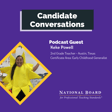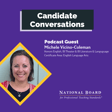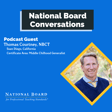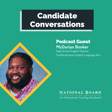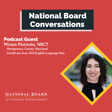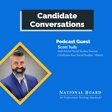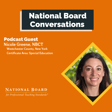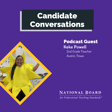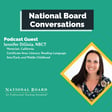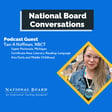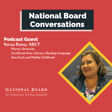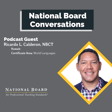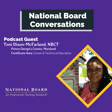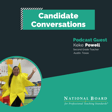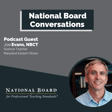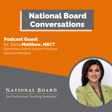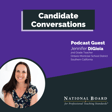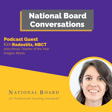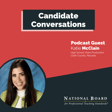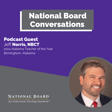Become a Creator today!Start creating today - Share your story with the world!
Start for free
00:00:00
00:00:01

Dr. Doretha Allen
In this episode, we are joined by Dr. Doretha Allen, an NBCT from Dallas Texas. Dr. Allen reflects on her journey and emphasizes the importance of community for the certification process. She shares key tools and principles that can assist candidates in the successful pursuit of certification. Dr. Allen also discusses how being unsuccessful in achieving some of her modules ended up being one of the most valuable learning experiences of her entire certification process.
Transcript
Introduction to National Board Conversations
00:00:02
Speaker
Welcome, welcome everyone. We are so excited to have you back here for our fourth episode. National Board Conversations is a podcast where I, Lucareid, amude your host, interview educators and teachers from coast to coast. We discuss their national board certification journey, their process, their experience, tips, tricks, and bits of wisdom they might have to offer you, and their thoughts on education and life as a teacher.
Meet Dr. Deretha Allen
00:00:27
Speaker
Today's episode, I had an amazing conversation with Dr. Deretha Allen from Dallas, Texas. She is an inspiring woman, mother, teacher, and I was just so intrigued and thrilled and happy that I got to talk with her. So without further ado, let's get going. Here's Deretha. I hope you enjoy.
00:00:46
Speaker
Hi, Doretha. Thanks for joining us. Hi, Luke. Thanks for having me. It is an absolute honor to have you. So why don't we jump right in, introduce yourself to our audience. OK. Well, hi, everyone. I am Dr. Doretha Allen, a nationally board certified teacher here in Dallas, Texas.
Balancing Motherhood and Work
00:01:01
Speaker
This is my 21st year in a profession. I'm a mother of two. And currently, I am working remotely, and I am helping my two children as they navigate virtual school. So it's quite an adventure.
00:01:15
Speaker
Yeah, this year has brought up some really unforeseeable and distinct challenges for people. How are you dealing with everything? I have found myself learning things and having to do them at a high level all at the same time. It's been a lot of pivots and quick turns, not only for me, but for my kids as well. So I've learned to extend lots and lots of grace to myself and to them. That's the message that I really try to share with teachers.
00:01:42
Speaker
Extend grace. It's okay. I think I'm going to remember that every day. That's a really good piece of advice. All the more reason to be having a podcast. People are at home. People are spending more time inside. So give them something to listen to. How are you feeling about being on the podcast? Man, I am so just over the moon, super excited. Peacock Proud. I came to National Board learning about it on my way to work, on the drive in, listening to NPR. And it was on a podcast where I learned about this national
00:02:12
Speaker
board certification process where teachers spend hundreds and hundreds of hours analyzing their practice so they can be the best teacher for their kids. So here I am, many years later, doing a podcast about National Board. And so it's really full circle for me, really full circle.
00:02:32
Speaker
Wow, this is kind of a serendipitous moment, then I guess maybe a little surreal too. Why don't we take a step back and you can tell me about how you became a teacher. Tell me about the history
Journey to Teaching
00:02:42
Speaker
behind that. Sure, sure. Well, first, I think I'm one of few educators who actually went to college to be an educator. So my undergrad is in elementary ed, I'm minor in English, and I spent lots and lots of time in classrooms as part of my undergrad program. And then I actually
00:03:02
Speaker
moved back home to Dallas after graduate school and started working in a neighborhood I grew up in. So that was fun because I instantly had street credit because I had the kids of my classmates and the people I grew up with. So I've been doing it 21 years and I'm still teaching every day, even though my profession has taken me out of the classroom into instructional coaching roles,
00:03:30
Speaker
in Central Office and now in the Office of Transformation and Innovation. I'm still teaching principals, teachers, and then students whenever I get a chance because it all impacts kids. So I'm very much connected to my teacher role.
00:03:47
Speaker
And you were teaching in a community that you knew well. Do you think that that was a benefit for you? Do you think that had something to do with the development of your teaching style and your identity as an educator? Yeah, I think so. Being from the neighborhood, I was in an area that is kind of resource deprived, low socioeconomic status. And there were just not a lot of resources. But I always had human capital that I tapped into back then.
00:04:14
Speaker
And in those early days of teaching, I don't know if I really considered it as human capital. I think National Board really helped me name the things that were around me that I was doing. So if there were events coming up and we didn't have resources to take kids on a field trip, but I knew a parent that had a skill set, let's say a parent that was a barber or a parent that was a beautician or a parent that was a plumber,
00:04:43
Speaker
I would ask them to come up to the class and share their expertise. So in that way, it's bringing the real world into our classroom. And I always had parents who were willing to share their expertise. They may not have had the money or resources, but what they had was their time and their talent. And they readily shared it. And I was kind of surprised that they were very honored
00:05:13
Speaker
because they never been asked to share that before. So in that way, I built those relationships.
00:05:18
Speaker
So you went there, you were teaching in your old neighborhood, and at what point did you decide you'd already done your master's, you said? When did you decide to start this national
Pursuing National Board Certification
00:05:27
Speaker
board journey? Well, it was after I completed a second master's, after I had been Teacher of the Year, after I had been the English Language Arts Teacher of the Year. So when I was on my way to work, and I heard this story about the gold standard of teaching, the top 2% of teachers,
00:05:45
Speaker
I really kind of was like, wait a minute, wait a minute. I don't know about this, but I'm definitely trying to get that, that gold star, that badge of honor. I want to be the top of my profession. So it was then I did a little research. I saw all the work that it took and you had to analyze your practice and you had to record yourself and all of these things. And I was not scared of work, Luke. I am not scared of work and I want it to be the best.
00:06:13
Speaker
I wanted to be the best. It was shortly thereafter that an email came out from my district that they were starting a national board cohort and apply. And so I immediately jumped on that opportunity.
00:06:29
Speaker
Wow, yeah, you definitely aren't shy of hard work. Two masters and a PhD and National Award certified. Any other huge feats in your career that we should know about? You know, the largest of them all is really the one I'm currently doing, which is mothering, mothering, working and trying to maintain my sanity during the pandemic.
00:06:52
Speaker
And trying to be a good wife, I failed to mention my husband. He is the supporting character in all of these tales, often the unsung hero. So shout out to my husband of 18 years, Sheldon. Wow, Sheldon, lucky guy. Listen to that. That's very touching. You've done all of these certifications and degrees. How does this national board stack up to the masters or the PhD journey?
Impact of Certification on Teaching Practice
00:07:18
Speaker
Man, let me tell you, Luke.
00:07:20
Speaker
Nothing, nothing, nothing impacted my profession like national board certification. Not one professional development. And let me tell you why. In education, lots of people come from the outside.
00:07:38
Speaker
consultants, telling educators, do this one thing and it'll make your life better. Do this one thing and it'll change how your students respond. Use this one product and it's better than sliced bread. That happens a lot. And you go to school and you study theories and you try to apply those theories in your class. And you study these researchers and all that other stuff.
00:08:04
Speaker
And all that's fine, right? Lots of people give master's degrees and doctorates. And I don't want to discourage people from doing that because that has its place. But National Board.
00:08:16
Speaker
certification, change the game. And this is why the standards guide the work. When you read the National Board Standards, you will read over and over and over again. Accomplished teachers know, accomplished teachers do, accomplished teachers recognize, accomplished teacher incorporate. It's all about the accomplished teaching practice. And then you apply those standards to your teaching practice.
00:08:46
Speaker
So it's this real live action research. This is a big shift in teacher practice. Before National Board, when my students had a great day and everything went off perfectly, I would say man.
00:09:02
Speaker
I did it today and I would pat myself on the back. When they had an off day and everything just kind of went off the rails and teachers listening, you know what I'm talking about? When you have those lessons and it kind of goes off the rails, I would say, man, I don't know what's wrong with my kids today.
00:09:20
Speaker
Now, after National Board, when there was a good day, it was because I planned for every single part of it. And when it was a bad day, it's because I planned for every single part of it. Their success and failure was all on me. I had to own it. Good, bad, and ugly. And that is the shift that I walked away with from National Board.
00:09:44
Speaker
Every instructional decision is connected and must be articulated. That's what accomplished teachers do. And everything is based on knowing your students, every instructional decision.
00:09:56
Speaker
And students are different. They are not a monolith. So you have to drill down and really know them. And I'm not talking about know them in an academic sense. You do have to know them in an academic sense, but that's just one way of knowing them. They are not flat, two-dimensional numbers on a page, but they are three-dimensional, multifaceted,
00:10:19
Speaker
with varied interests and hobbies and curiosities that we have to tap into as teachers. Only National Board has taught me that. National Board taught me that every instructional decision, I have to be able to articulate it and make the connections.
00:10:37
Speaker
Everything is intentional. For example, I taught reading. So I lived at the small group table, pulling groups of kids, working on reading, working on reading. And in reading, there are different levels of reading and there are books for those levels. So you get a kid a book right above where they can do it. And that's their instructional level. And you help them through that to build
00:11:04
Speaker
their fluency and comprehension. Well, National Board taught me, if this group of boys don't like reading, but I know they play football because I know my students, which is a big court prop in National Board, know your students, then let me find a text that will engage them and then I can hook them in. So everything is connected. Nothing is by chance. And National Board taught me that through practice.
The Power of Cohorts
00:11:32
Speaker
During the journey to getting certified, did you have a cohort or were you part of a kind of did you feel like you had a community to fall on? Yeah. So I'm so just so grateful for the insight of the leadership at that time in the district that really
00:11:50
Speaker
put support behind National Board and we had a cohort. And so we met once a month in the evenings, the Professional Development Department, they led us through and they talked to us and taught us about the five core props, the double helix, which is the architecture of accomplished teaching, the standards, the three different kinds of writing for National Board,
00:12:18
Speaker
descriptive, analytical, reflective. They taught us those things. And in between, we had to put our hand to the plow and do the work. We had to read, we had to study, we had to record, we had to plan, we had to gather student work samples. But when we came back together, we were able to talk about our struggles
00:12:39
Speaker
I didn't understand this part of directions. What did y'all get that? It was just this, it was like family. I cannot underscore enough the moral support, the content support that cohorts offer.
00:12:54
Speaker
It's an affinity group within itself because they're in the same struggle as you are. At my campus, no one really got it. They questioned while I was doing all this extra work, but the people who were in that group with me, they understood and we didn't have to talk about it because they were at the table. Just having that shared experience is so valuable. It's so valuable, Luke.
00:13:18
Speaker
So you not only got a lot out of being a part of a cohort, but now you facilitate cohorts. Can you tell me why you feel it's so important to keep this going and support teachers like this in this manner? Yeah, it is because I think about when I look back over my educational professional career, I think of all the people who have helped me, even as a child coming up in education, many doors were open to me for greater opportunities because of teachers who saw something in me.
00:13:48
Speaker
This is my way of paying it forward because I know if a teacher is better and I help them become better, it not only impacts the students that they have right now, but it impacts every class of students that that teacher has for the rest of their career. So we're talking about hundreds and thousands of kids being better because of something that I'm able to do with a group of 30 today.
00:14:12
Speaker
Are you aware of any misconceptions that you've heard from people that are starting out on the certification journey? I think that the biggest challenge or misconception when people come to the process is that they think it is a certification like a state certification where you take some classes and you pass a test and then that's it.
00:14:36
Speaker
That's a very flat view of it because it is so much more than that and they think it's a pass fail. And in National Boys' Circles, we don't say pass fail. We say you've accomplished or you haven't accomplished yet.
00:14:52
Speaker
And so it's a shift. It's not about opening this book and going to this page and reading this theory and regurgitating that theory and passing a test and checking the box. That's not what it's about. It is about taking a deep, deep dive into the standards
00:15:09
Speaker
into the architecture of accomplished teaching, the five core props, and holding your professional teaching practice up against that and making instructional decisions based upon it. Right. And for you personally, did you accomplish all of the modules your first try?
Overcoming Certification Challenges
00:15:28
Speaker
Yeah. So no, no, I did not. As a matter of fact, I missed it the first go around and talk about defeated. I was
00:15:38
Speaker
I was defeated, I was looking around and I was thinking to myself, man, these people don't know who I am. I had a bit of pride and I needed to humble myself to the process.
00:15:52
Speaker
It's then in that second year when I came back and redid an entry that it really clicked for me. Everything I did before was focused on me and what I did and what Miss Allen did and I made this lesson and I made these anchor charts. But it was really about my students' response because you can do all of that, but if your kids don't respond,
00:16:15
Speaker
then you have to do something different. That's what I learned that second year. So if people aren't successful the first time, I say that gives you more opportunity to be reflective. And I really am thankful that I didn't make it the first go around because I would have missed the lesson.
00:16:31
Speaker
The lesson that I needed, Luke, was that it's about my students and if they are receptive and if they learn from what I taught. Because if they didn't, then it's not their fault. It's my fault. And that I have to do something different. Instructionally, I need to do something different. That has been the game changer for me.
00:16:53
Speaker
as a teacher. That's an important lesson for the listeners is even someone with two master's degrees has to be reflective and has to sometimes take these things a second time around to make sure it's successful. Right. Because it doesn't matter if we taught it and how we taught it. It only matters if the kids got it. That's what matters.
00:17:14
Speaker
Did they get it? And how do you know? And if they got it, good. What's next? And if they didn't get it, okay, not good. What's next? What do you do to make sure they get it? So if people don't hear anything else that we've said, please hear that. National Board makes you teach in a way so your kids get it. And if they don't, then you know as a teacher you need to do something different. The kids don't need to change. We have to change.
00:17:43
Speaker
That's a great piece of wisdom to maybe sign off on. I think that is a great little end to it. Maybe the last thing I will ask you is if I was about to embark on this journey, if I was a prospect and I was thinking about getting my certification, what kind of advice would you give me?
Advice for Prospective Candidates
00:18:02
Speaker
Ooh, yeah, I would give one. Know that it's a huge commitment of time and you need to schedule time for it every day, every week, build that time.
00:18:16
Speaker
I would also say talk to those around you and let them know what you're doing. I would talk to your spouse. I would talk to the kids. I would talk to the coworkers. I would especially talk to my principal and say, I'm embarking on this journey. I need your support because everything that they ask kind of takes your energy and time. And the more you can focus on just doing your certification process,
00:18:46
Speaker
the better. And then it helps. Once a teacher has become an NBCT, it just spreads like wildfire throughout the building. And I think I would share the pros of it with my principal.
00:19:02
Speaker
This is why this is a good thing. This is why you should support me. Think of all the things I'm doing now. Imagine the notoriety we can have at our school. Imagine how many other teachers will follow my path. So I would definitely say, you know, alert the team because you need the support of those closest to you. And what words of wisdom do you have for candidates on their
Encouragement and Resources
00:19:28
Speaker
journey right now? So I would encourage them to go for it.
00:19:31
Speaker
and find help. There are lots of people who will help. As a matter of fact, I'm on the Texas National Board Coalition for Teaching. And we are connecting people who are going through the process by themselves with National Board Certified Teachers to be their mentor. And in the pandemic, everything is virtual. So they're a zoom away from support. So sign up today.
00:20:00
Speaker
That was a good promo there.
00:20:06
Speaker
Well, I couldn't think of a better thought to go out on. That was a really inspiring conversation. I was so happy to speak with Dr. Deretha Allen, and I thank you all for listening.
Conclusion and Further Resources
00:20:15
Speaker
Our next episode is coming hot on the trail of this episode, but in the meantime, if you want to learn more about the National Board for Professional Teaching Standards, check out the website at www.nbpts.org. My name is Luke Karaid-Amuud, signing off until next time. Cheers.
